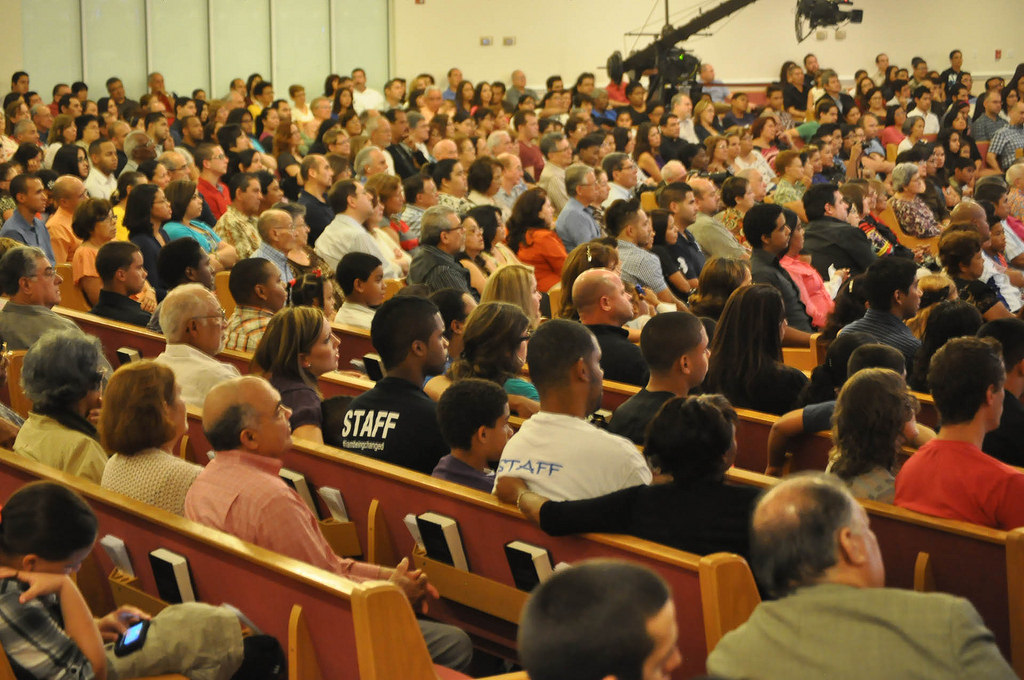All of us who were old enough remember the tragedy of 9/11. The Twin Towers in New
York were destroyed and the Pentagon in DC was badly damaged by three highjacked
commercial passenger planes. A fourth plane crashed in a Pennsylvania field. The death toll, including the passengers on the planes as well as the people in the targeted buildings, was nearly 3,000. Each of those three thousand people whose lives were so sadly cut short left behind loved ones whose unspeakable pain continues today, more than twenty years later. In fact, people across America and even the world felt the pain of that terrible day’s loss. It was the most tragic national event of my lifetime.

On the heels of that horrible day in 2001, was another day, not of terror but disappointing nonetheless, that not many remember or even recognized. It was the third Sunday after 9/11. Vivid in my memory are the worship services on 9/16 and 9/23. Those were
the two Sundays immediately following 9/11, and churches all across our nation were packed. I remember the sentiment of the day as everyone turned to God for comfort and answers. We were hurting and confused, and for two weeks we were keenly aware of our need for God.

But that third week something happened. We were suddenly okay. Not really, we only thought we were. And by 9/30 the desperation was noticeably absent. The masses’ hunger for God was short-lived. Church attendance was back to pre-9/11 numbers. I remember being in our worship sanctuary, expecting to see those same people who had attended the previous two Sundays, but they weren’t there. I was far more surprised at their return to life as usual than I had been at their rush to find God’s comforting presence two weeks earlier. That we would run to God in the wake of national calamity made sense; to become disinterested so quickly did not. How quickly apathy had supplanted our anguish.
Jesus said “I didn’t come for the righteous but for sinners…It’s the sick who need a
doctor, not the healthy…blessed are the poor in spirit/those who mourn/the persecuted…for theirs is the kingdom of God/they shall be comforted/great is their reward.” The poor in spirit are those who are aware of their need for God and are willing to seek Him out as beggars to get His help. Those who mourn are they who are fervently aware of loss and depend on God for comfort and restoration. The persecuted, those who have been wrongly harmed. 9/11 left behind people in all three of those categories. We knew we needed help, and for a mere three weeks we turned to God for it.
For two weeks our national personhood was poor in spirit, mourning, sick, stinging from
terrorist attacks. But then…it wasn’t. It was fine without God.
The world’s biggest problem can be summed up in this attitude: we believe we’re fine
without God. America demonstrated it in the three-week aftermath of 9/11. And most of us
demonstrate it every time we hit a crisis; we seek God for comfort, but then end that pursuit prematurely. I’m certainly guilty of it, and I propose that we all are because it’s a natural desirefor us to assume ourselves self-sufficient.
I’ve read through the Old Testament several times. Every time something that’s jumped
out at me is how quickly a generation of Israelites could forget God, despite His recent
intervention, and become dependent on some idol, a false god or their own strength. Now I’m not at all saying the 9/11 attacks were God’s intervention. Some well-meaning but off-base preachers proclaimed the attacks were God’s judgment on a nation that had turned its back on God. I don’t believe that. What I believe most ardently about the 9/11 attacks is that God will somehow use them (and already has used them) to bring about something good for those who love Him and embrace His purposes (Romans 8:28). And I believe those attacks should have caused us to turn to God for help and healing, relentlessly pursuing Him for the rest of our vulnerable lives. Even though we can’t blame Him for those murders, we could and should give Him our humble and complete attention, not for blame but for help. When we turn our attention away from God it’s usually a gradual process. We’re usually like the proverbial cold- blooded frog in the pot of tepid water on the stove. We aren’t thrown into water already boiling; rather, we’re sitting in comfortable water, and eventually, when it’s too late, realize we’re being boiled to death.

I understand that we can be mesmerized into destruction. What puzzles me is how relatively short the mesmerizing is, how soon we can self destruct. In the Old Testament, scenarios usually involved a generation or longer – though some were far shorter than that – before God’s people realized they had done a one-eighty from Him. The speediest one I can think of was during the generation that wondered through the wilderness for forty years. It was a mere three days of travelling after God had performed the most famous miracle in pre-Messiah history – the parting of the Red Sea. In three short days the Israelites had taken on an attitude of faithlessness and complained against God and Moses. Little did they know, God already had a plan to give them the fresh drinking water they needed. So as is always the case, turning their hearts defiantly away from God proved futile.
I recently had an old friend call me. He’d had a near death experience. Emergency
medical workers had to use CPR on him. Fortunately, he revived after a single chest
compression. It got him thinking about the brevity of life and being prepared for what’s next. We texted back and forth for several days, looking for an opportunity to get together. By the time we met for lunch, about two weeks after he first called, he was no longer interested in discussing eternity. I was very disappointed. I felt like the incident a couple weeks before woke him to the most important things, and by the time we got to talk, he’d fallen back asleep. He’s still in my prayers and I’ll continue to try to be there whenever he’s interested again. I hope that interest is sparked again, hopefully this time without a medical emergency.
I certainly have no room to pass judgment. I know I frustrated people who worked so
patiently through prayer and persuasion to help me come to Christ. And even since God gave me life and His very Spirit I’ve had frustrating patterns of cooling off in my devotion to Him.
Nevertheless, whether it’s we as a nation, my old friend, or I myself, the problem of
apathy toward such a powerful and loving God is unfortunate. Our solution? Like David, we
should hide God’s Word in our hearts, so that we won’t sin against Him. What Word? Here’s a good one:
Let us hold unswervingly to the hope we profess, for He who promised is faithful. (Hebrews 10:23)
